AAPI Stories: “Our Life Together Has Really Been a Gift”
Lily Mendoza and Jim Perkinson reflect on their relationship, their educational careers and dedication to social justice and how Jim had to learn how to eat like a Filipino.
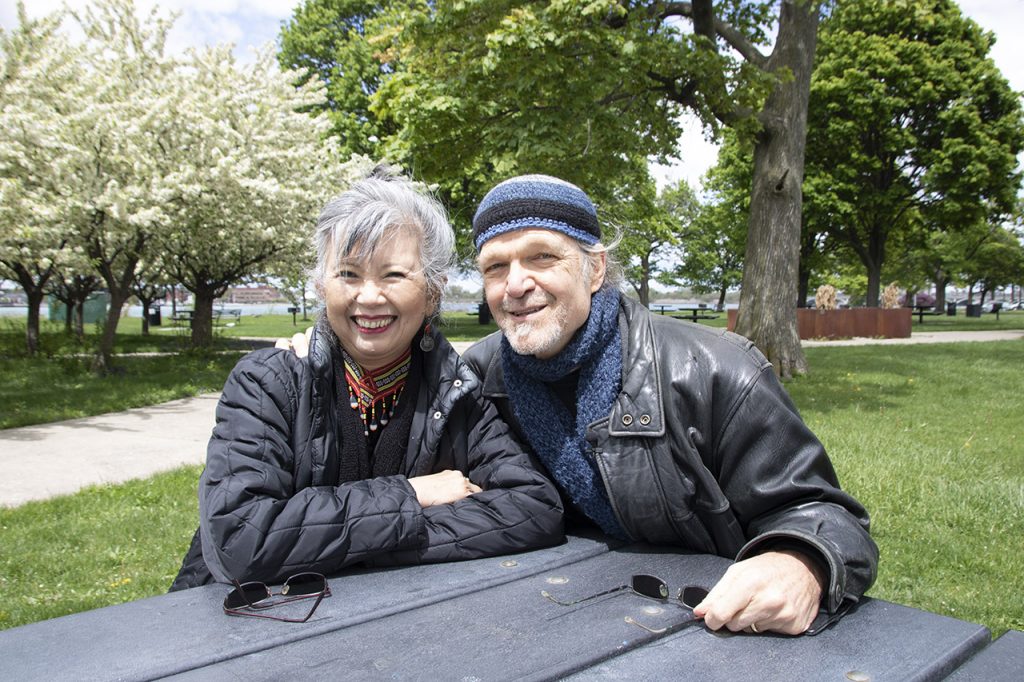
This month, WDET is amplifying the diverse stories of our local Asian American and Pacific Islander community, sharing the joys and struggles of being Asian American in Southeast Michigan. In collaboration with Detroit Public TV, we invited several community members to share their personal stories.
We want to hear your #AAPI story. Click here to find out more how to share your experiences and come back next week for a new story.
Within 24 hours of meeting at a conference, Lily Mendoza and Jim Perkinson knew they had found their life partner. Since getting married in 2004, they have built a rich and full life together as activists and educators who challenge their students to think more deeply about race relations and to share their personal stories while navigating the complexities of their relationship.
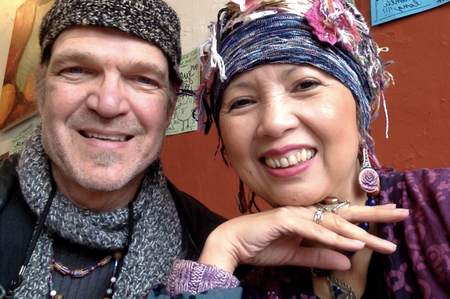
Lily was born and raised a pastor’s kid in the province of Pampanga in the Philippines. She came to the U.S. for graduate school in 1995. When she arrived, she worked on the indigenization movement in the Philippine Academy and in the Philippine diaspora in the U.S. “And so, that started my decolonization process, which is still ongoing after I met [Jim].”
Lily is a professor of culture and communication at Oakland University and the executive director of the Center for Babaylan Studies. She has written several books, including “Between the Homeland and the Diaspora: The Politics of Theorizing Filipino and Filipino American Identities,” and “Back from the Crocodile’s Belly: Philippine Babaylan Studies and the Struggle for Indigenous Memory.”
Jim grew up in Cincinnati, Ohio, and came to Detroit in 1974 “to be part of a Christian community experiment on the near east side,” he says. The 15 years he spent as a part of the Episcopal Church of the Messiah “was the deepest part of my education … to learn about this place called Detroit from a point of view very different than I grew up in.” He’s also a professor as well as an activist and poet.
They reminisced about meeting, the poem Jim wrote that won Lily’s heart and building a life together in Detroit during a conversation recorded on a windy, chilly day on Belle Isle.
Click the audio player above to hear how they met and fell in love, and read excerpts, edited for clarity and brevity, of their conversation.
On meeting at a conference in Wisconsin
Lily: OK, babe, you remember how we met?
Jim: I was working at the seminary … and the administrator came in to my office. She had an interest in me that wasn’t reciprocated. And she came in, right, a couple days before I went to the conference in Wisconsin, where we met and said, “Jim, I don’t know, I’m uncomfortable with you’re going to this conference. It’s not like the plane is going to go down, but you’re going to disappear.” And when she said that, my mind immediately went, “Oh, you mean, I’m gonna meet somebody.” I had been going to conferences and gotten all the way to the age of 50 without actually getting married, been in and out of relationships. As soon as I heard that, I thought, “OK, we’ll see.”
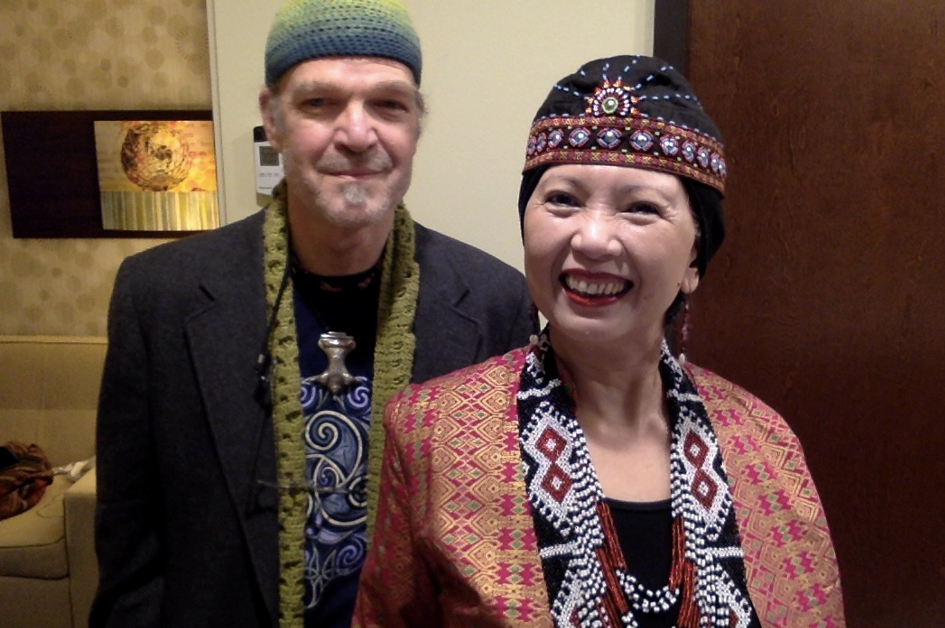
Lily: I remember it starkly because that was my first trip right after 9/11 in 2001. And my presentation happened to be on the very first day at eight o’clock in the morning, and I lined up to the coffee pot.
Jim: Fortunately, I was a coffee addict. So I was up and in front of the coffee urn with everybody else waiting.
Lily: Yeah. And you were such a loudmouth, I overheard you speaking and telling people that you were doing critical race theory. And that you were headed to Denver, where I was then teaching at the University of Denver. And so right when you step behind me for the beeline to the coffee pot, I said, “Oh, I better chat with this person.”
Jim: I don’t quite know how I ended up behind you in the line. But I think you arranged that. So you could turn around and …
Lily: You wish!
Jim: You let me know where you were presenting. So I showed up there and you presented and you were really good. And I was really interested then. And so I got hooked pretty quickly.
Lily: And then when we had lunch, we sat together. And before you knew it, everybody was already done after the session and we were still talking. And what was remarkable for me in that conversation was that I realized I’ve never been listened to as deeply as you listen to me that the time.
Jim: We had to go by bus a short distance to a hotel for the banquet dinner. So I went and camped out outside the bus door, figuring she’s got to get on here. You saw me and waved but kept on walking. And so my sort of roller coaster ride of interest took a downturn. I got on the bus and chatted up some folk to be sure I had somebody go out and drink with when the banquet was over, started walking to the banquet room, and then boom, all of a sudden, there you are again.
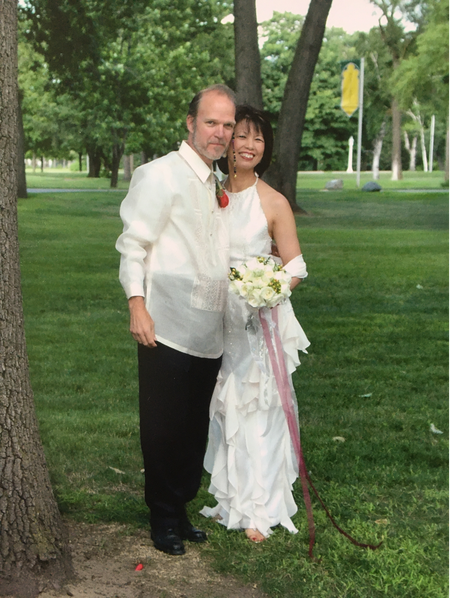
Lily: We ended up sitting together at the banquet.
Jim: And so the roller coaster started to go back up. And then right at the end, after we’re done eating, and then hearing the speaker, you turn to me and started expressing a little bit of interest with some attention. And so I, as I recall, instantly asked if you wanted to go out and get something to drink, and you said yeah, even though you don’t drink alcohol. And I made sure we went someplace other than where this group had planned to go, so I would have you all to myself. And then the rest is history.
Lily: And that night when I got back to my hotel room, I remember calling my sister and said, “I met someone!” And I think I gushed a little bit. Although part of me said, “I’m going to attend his sessions tomorrow. And he better not be good because if it’s good, then I’m gone.” And the next day I did go to your session. And I remember you were talking about the colonial gaze as some kind of witchcraft. And I said, “Wow, how can he speak about the colonized experience as if you were talking about it from inside his own experience, this white guy, right?” Yeah. So that was really remarkable for me. And right after I think I pulled you away, and I said, “I’m going to give you my own standing ovation.”
Jim: Yeah. So I was feeling pretty good at that point. And we walked and talked for a while. And I had been planning on going to AAR in Denver, where you were teaching, and was flying back early in the morning to catch a session there. And you asked me to change my flight plans.
Lily: And by then I knew enough of you and your commitment. And when you changed your flight and paid the $100 fee …
“I knew from my experience in Detroit over at that point in time, we’re talking almost 30 years of being schooled by Black humor and Black anger about white supremacy and settler colonialism and having to come to grips with that continually. So here was a new theater of those relations that I needed to get up to speed.” — Jim Perkinson, speaking to his wife, Lily Mendoza
Jim: Yeah, I was basically, at that point, living as an adjunct, teaching in various places around Detroit without benefits and on a poverty level. But I wanted to be with you so that it’s not a question mark. In my mind, I’ll figure out how to pay the extra. And so we got on the plane, rode together and sort of planned some things and then got to the airport. And you said, “OK, I’ll see you in a couple of days.” I thought we were together!
Lily: Well, you and I were both with other people at the time, and I had to break up with my boyfriend at the time!
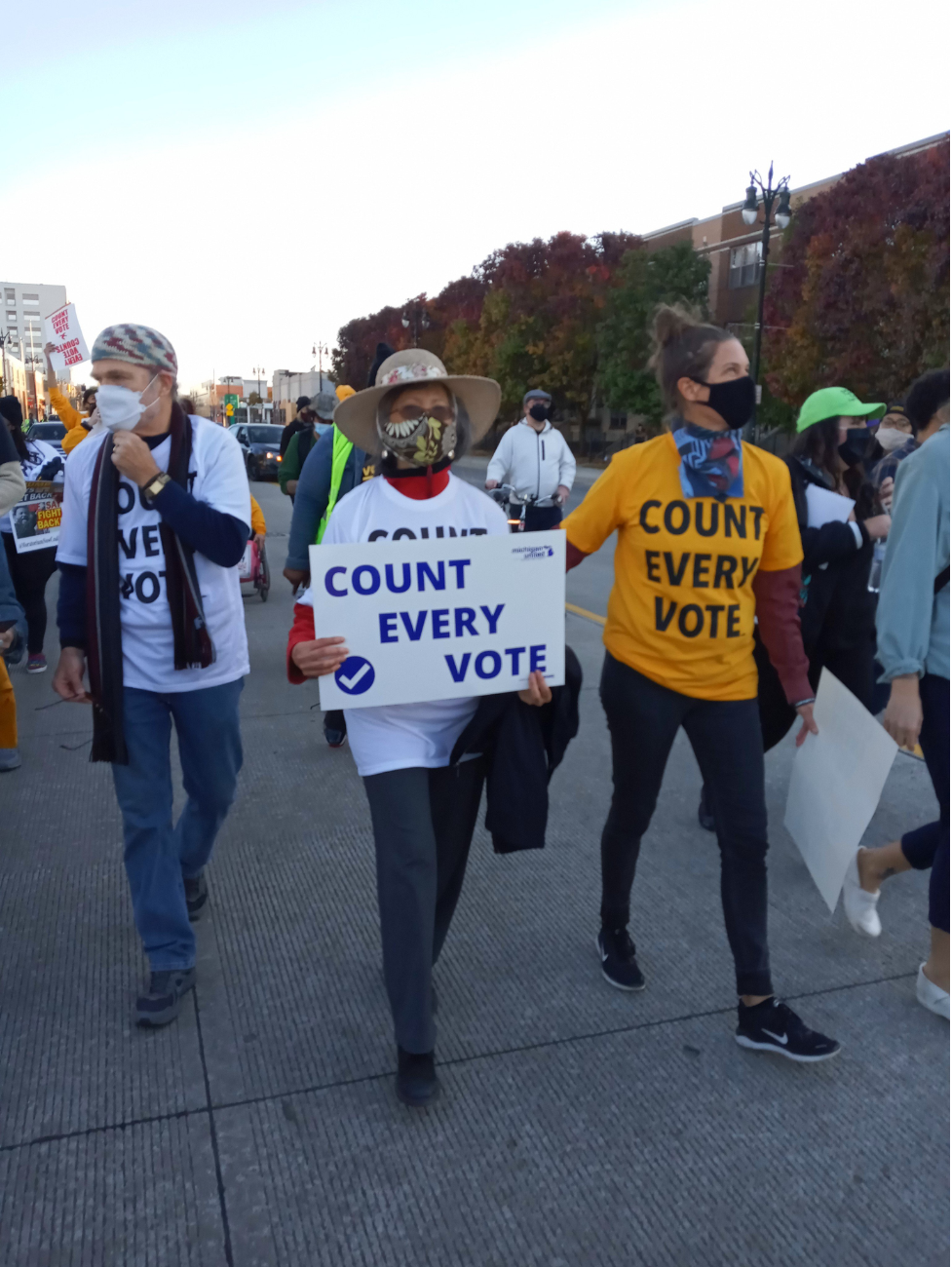
Lily: One of the things that I think we got the talking earlier on was, was the history between the U.S. and the Philippines. And you were a Ph.D., a graduate of the University of Chicago and knew nothing about it.
Jim: Yep. I, I remember that being sort of smacked in the face with my, my ignorance. And I knew I needed to, to get up to speed quickly. So I started doing research on U.S.-Philippine colonial relations, reading Jose Rizal …
Lily: I’ll never forget, you came and, and read me a poem about that.
Jim: Which I just happen to have here.
Lily: This is the real clincher for me.
Jim: I knew from my experience in Detroit over at that point in time, we’re talking almost 30 years of being schooled by Black humor and Black anger about white supremacy and settler colonialism and having to come to grips with that continually. So here was a new theater of those relations that I needed to get up to speed. I had become a spoken word poet over the years in Detroit and often would process my experience in a poetic vein and so figured I would put what I was learning out as an offering and called it “li’s song. the first attempt.”
Listen: Jim reads the poem to Lily (and click here to read a copy).
(After Jim finishes reading the poem, Lily pats her heart several times.) Lily: Still gets me. Thank you, thank you.
Jim: I should probably read that every week.
Lily: How could I not be with you after that?
On kapwa, the concept of shared being
Jim: Very quickly what I had to learn was about the cultural difference between my whiteness and being run through the inner city, and your Filipino-ness.
Lily: We have this core value among our indigenous cultures. In the Philippines, it’s called kapwa, which is shared being, the other as part of one oneself too. And so, it comes with a whole complex of communication dynamics, right? That is not this individualistic thing. And a lot of it carries an indirection or requires an indirection.
“I would get so frustrated because you couldn’t sense me. And we had to work it so I would also learn to speak my heart.” — Lily Mendoza to her husband, Jim Perkinson
Jim: What I remember early on you one night asking me, “Babe, what do you want to do?” And I told you, something like, “Let’s get a pizza and go see a movie.” And you were kind of put off by that. And only slowly did I learn, as you educated me, that what you really were inviting was for me to very obliquely indicate what maybe I might like to do, and then you would do the same, and then we would go back and forth in it. And a dance that was delicate and exquisite, and arriving at the decision was every bit as important as what we actually decided to do, because it was just living out of the quality of the relationship, and that kind of nonverbal or very indirectly verbal sensitivity and knowing of each other … I’m still learning.
Lily: Yeah, and for my part, I also had to learn a different way, especially when it came to our conflicts. We have this other cultural thing that we call tampo … It’s a delicate feeling of hurt, where you withdraw and you expect the other person to read you. And I would get so frustrated because you couldn’t sense me. And we had to work it so I would also learn to speak my heart.
On learning how to eat like a Filipino
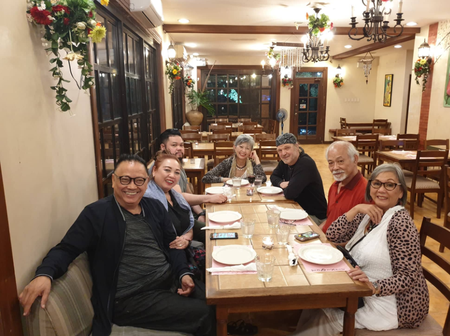
Lily: When you asked for my hand in marriage, do you remember when we went home?
Jim: Your mother was something else, I memorized a little bit of Kapampangan, read them a poem, and then promptly forgot part of what I was going to say in your mother tongue. And after a while, your dad went off to do stuff in the backyard, and your mom was sitting there looking off in the distance and said, without looking over at me, “That Lily, I don’t know about her, she gets bored very easily.” And it was a kind of indirect warning to me that if I was gonna continue to pursue her daughter, I better measure up and stay lively and stay interesting, or I would be in trouble. So am I in trouble, babe?
Lily: Remains to be seen (laughs). What I was going to say was the other thing that we had to negotiate was the protocol around food. You were frustrated being in the Philippines because we were getting fed — every single house that we visited, they would put a spread.
Jim: … I had like six meals in four hours.
Lily: Rather than getting frustrated, you have to understand that food is a language in my culture, as most indigenous cultures also do. And you sample.
Jim: I’m still learning how to do that, but I think I’m much better at it than I used to be — understanding how crucial food is to you.
On settling in Detroit
Jim: Something else we should talk about is your first experience of Detroit. I remember you saying “Detroit is so different than Denver. I feel at home here. I don’t feel the same kind of tension.”
Lily: And I think part of that is because it’s majority Black. And the white folks who decide to stay have had to learn to negotiate with the culture in a way that a majority-white city doesn’t have to do.
Jim: It was important to me that you found Detroit to be such a home for you.
On the term Asian American and the recent rise on attacks on Asian Americans
Lily: I’ve not really identified as Asian American. I still have a very strong connection to the homeland. And probably, I would say, I identify more as a diasporic Filipina. And of course, within the Asian community, you also have this hierarchy of ethnicities that is there as well. But, you know, the recent anti-Asian hate that’s been going on …
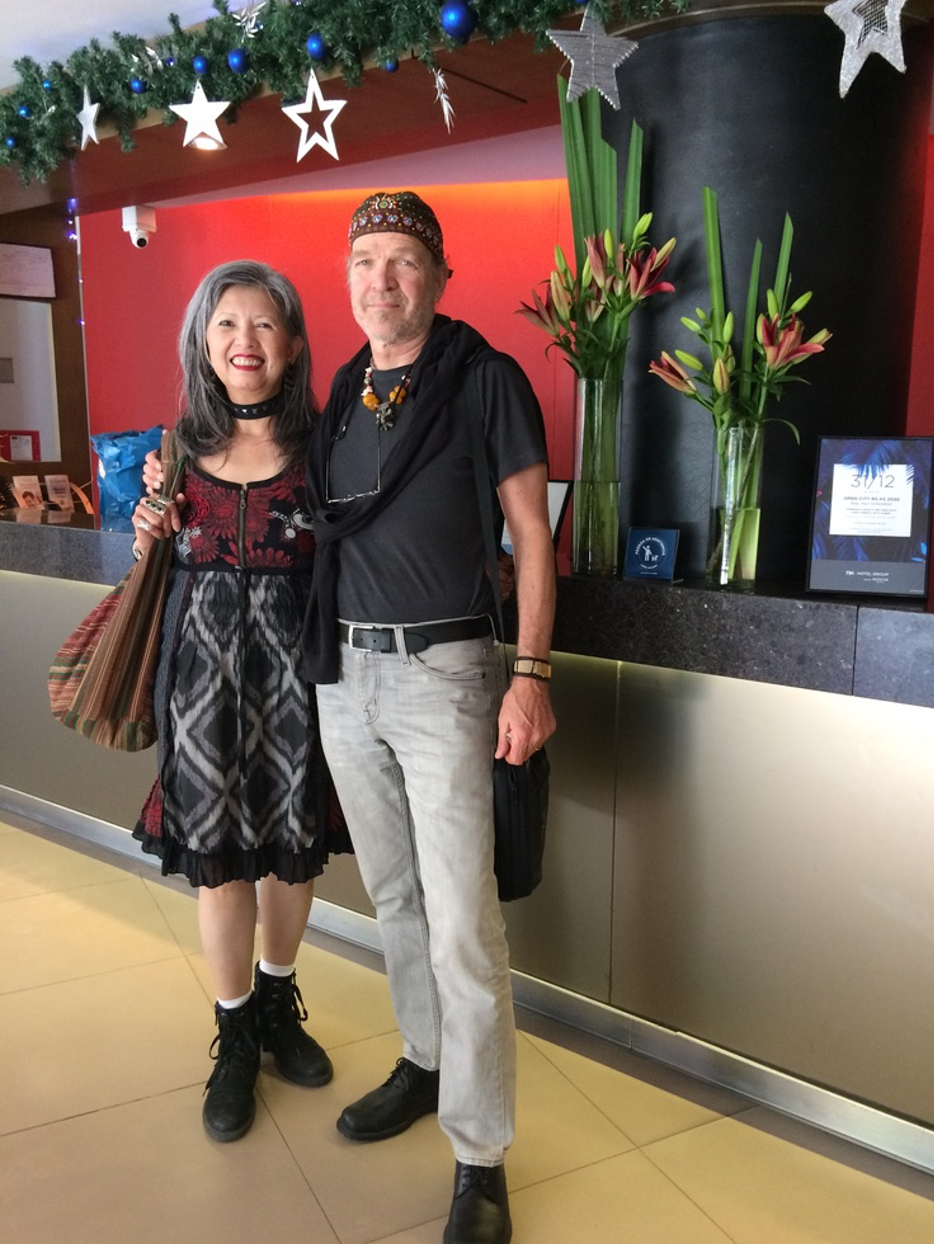
Jim: Just this morning I was reading about Vancouver being host to more anti-Asian hate crimes and incidents than the top 10 most populous U.S. cities. And it has me been thinking about you in a very different way, because I’ve never really identified you as being at risk until this latest COVID-related spate of white and other people acting out on Asian-looking bodies. I’ve never introduced you to my friends as an Asian woman, always as a Filipina, and it’s been a schoolhouse for me to get underneath these big categories that lump all kinds of people together, and know some of the particularity of your background and history.
Lily: And what [the rise in anti-Asian hate] has done, for instance, is we have young people asking us Filipinos, should we make patriotic masks for our parents to keep them safe? You know, to put flags on the [masks]. It’s really, really sad. Yeah, but not surprising to me, given the racism that is so deep.
Jim: And reading the thing about Vancouver I thought about your brother. It’s actually Richmond in the southern part of Vancouver where he lives where he and Viv, his Chinese wife, are at risk.
Lily: I’m just so glad that we are together and our life together has really been a gift to me. I can’t imagine what it’s like not having you alongside.
Jim: Yep. And true for me too, I don’t actually have much energy to think about that. Because I know I would be in many ways lost without you, without somebody who’s step by step with your own spice and particularity, not exactly like me, but very much on the same tack. And just to be able to live life and respond to what’s going on politically, and racially and socially, at every moment, whether it’s watching TV, or reading material, or interacting with friends, I know you’re seeing the same thing, in the same depth with the same precision. And we just don’t have to spend time accommodating each other or bringing each other up to speed. It’s just right there. And that’s amazing.
Trusted, accurate, up-to-date
WDET is here to keep you informed on essential information, news and resources related to COVID-19.
This is a stressful, insecure time for many. So it’s more important than ever for you, our listeners and readers, who are able to donate to keep supporting WDET’s mission. Please make a gift today.
